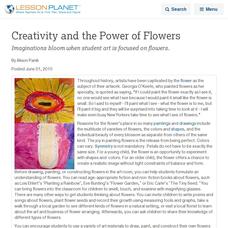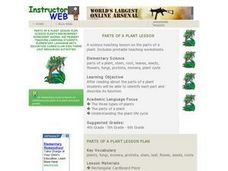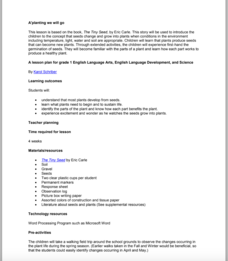Curated OER
The Flower and the Fly
It's like a biological "Beauty and the Beast!" The fascinating mutualism between a South African meganosed fly and a deep-throated geranium builds a case study in coevolution for your biology buffs to analyze. After reading about this...
Teacher Web
Plant Reproduction—Structure of a Flower
What happened to the plant in math class? It grew square roots. Here, a set of 11 worksheets provide a review of plant reproduction. It includes the structure of a flower and each part's function, pollination, fertilization, seed...
Curated OER
What Parts of a Plant Do We Eat?
Did you know that tomtoes and cucumbers are actually fruits? Biology or botany beginners read about the function of flowers and fruit and find that some food items commonly called vegetables are, by definition, also fruits! Give learners...
Curated OER
Planting a Rainbow Bulletin Board
Students explore a variety of colors and shapes after reading the story, "Planting A Rainbow," by Lois Ehlert. The tracking and reading of labels attached to diagrams form an experience in vocabulary development in this lesson.
Curated OER
Let's Learn About Plants!
After listening to From Seed to Plant by Gail Gibbons, learners take a walk around their school looking for plants. They use digital cameras to photograph the plants, then construct a class book which has the identities of the plants,...
Curated OER
Reading Comprehension 8
What is a gall, and where is one typically located? Learn about this interesting insect home while reading this short passage. If you're looking to give your kids some test prep, this is a great resource for you! After reading the short...
Curated OER
Giant Smelly Plant Attracts Thousands
Read and discuss a news article about a rare corpse plant that bloomed in Washington D.C. Because this native Indonesian plant blooms so rarely, people flock to see it. After reading the article, your class answers comprehension...
New South Wales Department of Education
History of Plant Classification
Bamboo, the fastest growing plant in the world, can grow up to 35 inches in one day! Pupils learn how plants historically have been classified and determine if these traits are appropriate to use in this 17th lesson of 20. They will also...
Curated OER
The Plant Food Factory
Plants need sun and water to survive. Let kids discover these facts by reading a block of informational text and considering a scientific quandary. They read the text, then use the information to complete a two-part question about plant...
Curated OER
Flowers and Their Life Cycles
First-time florists will be able to label the structures of simple and composite flowers after reading this handout and answering the comprehension questions. There are a couple of grammatical errors in the text, but the content is...
American Museum of Natural History
What's This? Reproduction
Attracting the right mate is as important for humans as any other species. An interesting lesson teaches individuals about several strategies that animals and plants have adapted to attract their mates. From colorful nests to powerful...
DePaul University
Settlement
Early settlers in the American Midwest experienced constant struggle. This reading passage describes for young learners the hardships of homesteaders as they journeyed west and sought to start a new life. When finished, students identify...
Curated OER
Bee Pollen Popular
The world would be a much different place without the help of pollinators. Read about the important role bats, hummingbirds, and various insects play in plant reproduction, exploring the interdependence of living things in an ecosystem....
Curated OER
Creativity and the Power of Flowers
Imaginations bloom when student art is focused on flowers.
Curated OER
Winnie the Pooh discovers seasons
Here is a charming activity on the seasons. Young learners watch a video about Winnie the Pooh and seasons which is embedded in the activity. They read sentences, fill in the blanks, and identify seasons based on the Winnie the Pooh...
Curated OER
Parts of a Plant Lesson
Students, after reading about the parts of a plant, identify each part and describe its function.
New South Wales Department of Education
Plant Groups
Bryophytes can grow in temperatures just above zero degrees. This 17th installment in a series of 20 introduces learners to the five groups of plants: algae, bryophytes, pteridophytes, gymnosperms, and angiosperms. Classes then explore...
Curated OER
Spring Time Trees/Flowers
Plan ahead! Integrate science and language arts! Schedule your reading of C.S. Lewis’ The Lion, the Witch, and The Wardrobe to coincide with the arrival of spring. As pupils read Chapter 11 of the Lewis classic, they are assigned one of...
Curated OER
Parts of a Plant
Students explore biology by listening to an in-class lecture. In this plant science lesson, students sing songs with their classmates regarding anatomical parts of a plant and create plants from arts and crafts materials. Students listen...
Curated OER
Let's Learn About Plants!
Take your class on a nature walk around the school and have children assume the role of "Plant Hunter" as they go. The goal is to explore the different parts of a plant. They return to the classroom to discuss the parts that they saw and...
DePaul University
Seasons on the Prairie
Fact and opinion passages inform readers about the seasons on the prairie and Zambia in Southern Africa. Then, test scholar's knowledge with multiple choice and short answer questions.
Curriculum Corner
Coniferous and Deciduous Trees
What are the differences between coniferous and deciduous trees? Supplement your tree lessons with a set of activities that has learners describing, naming, comparing, and reading about deciduous and coniferous trees. The activities are...
Curated OER
A'planting We will Go
Germination is an amazing process that results in amazing things. The book The Tiny Seed is the inspiration for a set of activities that will help build early literacy, observation, language, and writing skills. The class observes how...
Chicago Botanic Garden
Plant Phenology Data Analysis
Beginning in 1851, Thoreau recorded the dates of the first spring blooms in Concord, and this data is helping scientists analyze climate change! The culminating instructional activity in the series of four has pupils graph and analyze...

























